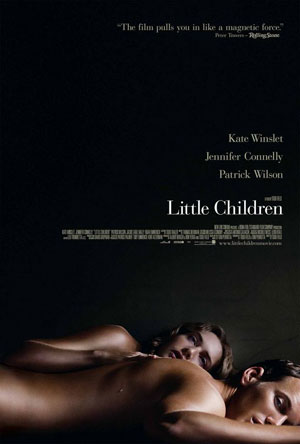 As far as I’m concerned Todd Field has made me a job offer. At the end of this interview he told me that if he ever made a movie that would feature a younger Stanley Kubrick, he would call me. I knew this CHUD gig would get me places.
As far as I’m concerned Todd Field has made me a job offer. At the end of this interview he told me that if he ever made a movie that would feature a younger Stanley Kubrick, he would call me. I knew this CHUD gig would get me places.
I was talking to Field about his new movie, Little Children, one of the best movies that played at a very strong New York Film Festival, and which is right now in limited release. Based on the novel by Tom Perrotta, who also wrote Election, Little Children is a funny, sad, truthful and often almost unbearably tense movie. Kate Winslet is Sarah, an unhappy suburban housewife who meets Brad (Patrick Wilson), an unhappy suburban househusband and they start an affair. Meanwhile Ronny, a sex offender (played by one-time Bad News Bear Jackie Earl Haley) has been paroled back to the community, much to the consternation of Larry (Noah Emmerich), a former cop with a dark history. Little Children is a brilliant film, one that I hope gets remembered at Oscar time – sort of like Field’s first movie, In The Bedroom.
Often when you’re at a roundtable (and by the way, this was one of the all-time great roundtables – just me, Ed Douglas from Coming Soon, who is a smart and incisive interviewer, and some kid from some college. Score!) you’ll end up discussing the movie in between interviews, and we had all been talking about how much we liked the performances. Just before Field came in we ended up talking about Jane Adams, a great character actress you might recognize from many films where she plays women who are crazy, tightly wound or very on edge. She has a role like that in Little Children – a small, but quite memorable role.
Q: Before you came in we were talking about Jane Adams. Do you feel a little bad calling her up and saying, ‘Jane, here’s another crazy character for you to play’?
Field: That’s a good question. I saw so many actors for that part and I had this rule, which was I didn’t to cast anyone who, as you say… So of course I’m seeing these people and then I see Jane. She sits down and reads with me. Everybody else who came in played kind of crazy, they played someone who had had a couple of nervous breakdowns. But Jane didn’t do that. She brought this very grounded, dignified – for lack of a better word – interpretation of the character where she was really committed and wore her heart on her sleeve. It was interesting and different from what you mind have imagined Jane Adams would have brought to it. When she finished reading I offered it to her immediately because it was so exquisite – no one had even come close to what she had done.
Q: How was it working with such young children?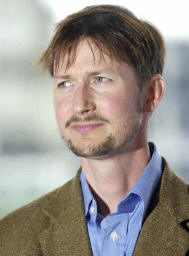 Field: The first challenge before we began filming, and I think the most anxious element for me, was that I had two three and a half year old children. I didn’t have doubles for them – they were it. They were very special kids. We went through a long search for them and we got down to a half dozen kids. Kate came in and we settled on Sadie Goldstein and Patrick came in and we settled on Ty Simpkins. But there are no doubles, and they’re in 40% of the production. You can only shoot those children for six hours a day, so it nearly doubles your budget and nearly doubles your production schedule. Going in, those elements, not the least of which is that they’re three and a half year old children – they’re not actors, they’re very alive, they’re children, which is why we like to watch them – what are they going to do? I’ve worked with kids of all ages, but I never worked with kids that young. That’s where Kate and Patrick made a huge contribution. They made many contributions to this film, but that was a fundamental one – they had to co-direct with me. Anything with the kids they were directing as much as I was, because they had to have a very loving, trusting relationship with those children to where those children would do what they wanted them to, and those children would cooperate with them.
Field: The first challenge before we began filming, and I think the most anxious element for me, was that I had two three and a half year old children. I didn’t have doubles for them – they were it. They were very special kids. We went through a long search for them and we got down to a half dozen kids. Kate came in and we settled on Sadie Goldstein and Patrick came in and we settled on Ty Simpkins. But there are no doubles, and they’re in 40% of the production. You can only shoot those children for six hours a day, so it nearly doubles your budget and nearly doubles your production schedule. Going in, those elements, not the least of which is that they’re three and a half year old children – they’re not actors, they’re very alive, they’re children, which is why we like to watch them – what are they going to do? I’ve worked with kids of all ages, but I never worked with kids that young. That’s where Kate and Patrick made a huge contribution. They made many contributions to this film, but that was a fundamental one – they had to co-direct with me. Anything with the kids they were directing as much as I was, because they had to have a very loving, trusting relationship with those children to where those children would do what they wanted them to, and those children would cooperate with them.
Q: Can you talk about the mix of comedy and drama? Tom Perotta has mentioned that some lines in the film that were lifted straight from the book get huge laughs, where he hadn’t realized they were funny on the page.
Field: Tom said that when we were working on the script. There are a couple of films and a lot of books, like when the novel created in the 19th century – Tolstoy, Austen, whatever – that would have third person narration that would have passive observations about the characters. We began to read a lot of Tom’s prose in the room when we were working and he would start cracking up and say, ‘I never thought that was funny before.’ And I would say, ‘I think that’s hysterical.’ Tom writes satire and humor so well, but he’s also a humble guy. I don’t think he thought everything he wrote was hysterically funny. Once we read it in the room he realized it was funny, and we tried to find an image to fit that prose.
There are a lot of things that I thought were funny that still no one thinks is particularly funny, but a lot of those things… the first time we screened at Telluride I heard the audience laughing and I thought, ‘Thank God somebody thinks this is funny too.’ Something as simple as: ‘What are you reading?’ ‘Crime and Punishment.’ Big laugh at Telluride, but we screened it in Pasadena and nobody laughed! Or when Sarah says to Teresa, ‘Maybe your brother should be castrated,’ and she says, ‘It’s not the same thing –he wasn’t doing it to strangers.’ I think it’s hysterical.
I’ve always thought a lot of it is funny. A lot of it is overtly funny, but a lot of it is also funny foolish.
Q: It’s a big change from In the Bedroom, which is much more grim.
Field: Oh, there are a couple of laughs in there. Like when he catches Frank and Natalie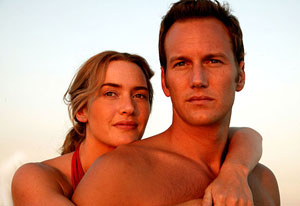 upstairs when they’re having each other in the afternoon and he starts feeding them coleslaw and he takes them to the ballfield and puts them on the spot. But you’re right – those are probably the only laughs in the film.
upstairs when they’re having each other in the afternoon and he starts feeding them coleslaw and he takes them to the ballfield and puts them on the spot. But you’re right – those are probably the only laughs in the film.
Q: Was it working with Tom that brought some of that out?
Field: Sure, it did. But I like to laugh. I don’t want to go out and make The Silence or anything. I love films like that and I’m attracted to films like that, but I’m also attracted to Preston Sturges. As an actor I only had the opportunity to work on something you would think was even remotely funny one time. I remember sitting in that theater and hearing the laughs and thinking, ‘God this is terrific – why can’t I do more comedy?’ I said that to my agent and he said, ‘No, you’re a straight dramatic actor and people see you like that.’ But I’m a funny guy!
Q: Who is the narrator?
Field: Will Lyman, from Frontline. I knew it would be Will from the beginning. In fact, I said to Tom, we should only do this if we can get Will Lyman to do it. I don’t watch any television – I have a set of rabbit ears and if I stand a certain way I can get a ballgame or PBS up in Maine, but the one thing I’m addicted to is Frontline. He has a very particular kind of voice that, for me, is almost like the Cronkite of our age. There’s something incredibly grown up about it, with authority and a lack of judgment. It’s a very even handed voice – it’s framed certainly by Frontline – but if Will Lyman said, ‘You’ve jumped out of a window and you’re lying broken on the sidewalk,’ I would believe him.
Q: What is it that draws you to stories about families?
Field: I don’t know. Before this I was working on this Edwin Booth project [the brother of John Wilkes Booth], but I guess you could argue that’s a family story too.
I started a family very young. I have a daughter in college here in New York. It’s fairly reflective of my life, being a parent. Everything you have to go through as a parent, dealing with the hell of school and teachers and administrators and other children giving your children lice or marijuana or whatever – it’s fairly dramatic and fairly constant. But I don’t see myself necessarily doing family dramas or family satirical melodramas – I’m working on something now that doesn’t have anything to do with family… but who knows, I’m still working on the script, so maybe it will become that! 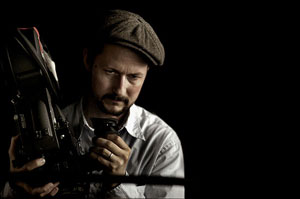 There are a lot of people I know who started families much later than I did, and their work is about their own kind of extended families, which had to do with acquaintances and friends. But I don’t really relate to that that much. My family is very close, and very close-knit, and there’s so much drama between everyone. Daily, so much drama and intrigue and all kinds of stuff that I suppose attracts me. The truth is that other than some adolescent project that I wrote many years ago that I’ll probably do ten years from now, I’m looking forward to where my life is going. I have one child that left the house and two more that will be leaving the house fairly soon, within a decade. What’s to become of me? What’s to become of my wife, what’s to become of my children? Those are real concerns for me on a daily basis, so I suppose that interests me.
There are a lot of people I know who started families much later than I did, and their work is about their own kind of extended families, which had to do with acquaintances and friends. But I don’t really relate to that that much. My family is very close, and very close-knit, and there’s so much drama between everyone. Daily, so much drama and intrigue and all kinds of stuff that I suppose attracts me. The truth is that other than some adolescent project that I wrote many years ago that I’ll probably do ten years from now, I’m looking forward to where my life is going. I have one child that left the house and two more that will be leaving the house fairly soon, within a decade. What’s to become of me? What’s to become of my wife, what’s to become of my children? Those are real concerns for me on a daily basis, so I suppose that interests me.
Q: You made some interesting casting choices in this film, and not just with Jackie Earle Haley. What made you decide to cast Kate Winslet as a plain woman?
Field: You don’t think of her as plain because she’s a movie star. Kate is a beautiful human being in terms of what comes out of here, but if she wasn’t a movie star and you saw her walking down the street she’d be a pleasant looking woman. I think she’s beautiful because of who she is. I don’t think that physically you would think of her walking down a catwalk in a fashion show. I think she does represent the average woman, and that’s why women relate to her in an intensive way. The funny thing is that once there’s any glamour attached to people who appear in film, all of a sudden they’re beautiful. I think she represents an average woman of that age.
The reason I wanted to cast Kate was because I had seen her in Eternal Sunshine of the Spotless Mind, and there was a moment where she hits Jim Carrey that was so shocking and alarming and surprising that the whole movie is built around that moment. I found out later of course that she just did it – it wasn’t scripted and there was a lot of drama around her doing that. But for the rest of the movie you’re watching her going, ‘My God, what is she going to do.’ This character [in Little Children] is in search of an identity. She’s at a crossroads; one moment she’s just a complete mess – she’s completely deluded and foolish – and at the next she’s wise and the next moment she’s desperate and the next moment she’s… There’s a lot of things going on that require modulating a performance between humor and melodrama and emotional truth within those two pieces of framework. Those are very, very tough things to go on, and you need somebody who’s not playing them, who has ten things in the air. That’s what she is able to achieve as a performer that I think is incredibly rare and very exciting to watch. If she hadn’t said yes when I asked her to do this, I don’t know who I would have gotten – honestly. I can’t think of anyone else who could have done this character in the way I had dreamed of it being done.
Q: What about Patrick Wilson? He seems to have been on the edge of breaking through before this.
Field: With Patrick you have this character who is a boy-man of sorts, but I didn’t want to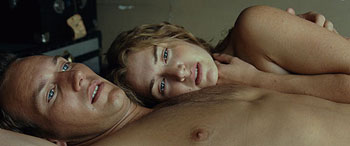 get a boy-man actor. We have this glut of leading men who are boys. They’re boys until they’re 50. I wanted a guy who felt like when I grew up and was watching movies, like Newman or Redford or whatever. I had seen his work in Angels in America and I was incredibly impressed by the strangeness of that work. When I sat down with him, I thought – there’s the guy. This guy’s a man. He’s an incredibly mature guy, very athletic, knows who he is, is a very able performer and is not a boy-man. He’s a man. Because of the character he’s playing, who’s emotionally a boy-man, the idea of those things meeting interested me.
get a boy-man actor. We have this glut of leading men who are boys. They’re boys until they’re 50. I wanted a guy who felt like when I grew up and was watching movies, like Newman or Redford or whatever. I had seen his work in Angels in America and I was incredibly impressed by the strangeness of that work. When I sat down with him, I thought – there’s the guy. This guy’s a man. He’s an incredibly mature guy, very athletic, knows who he is, is a very able performer and is not a boy-man. He’s a man. Because of the character he’s playing, who’s emotionally a boy-man, the idea of those things meeting interested me.
Q: And Noah Emmerich?
Field: In terms of Noah, Noah was someone I was desperate to get. I really had to fight to get him – the studio didn’t want him for all kinds of reasons. A, his brother’s the head of the studio, so they were really against it. I had to campaign for months to try and convince them he was a good idea. I had seen him in The Truman Show – I found that film interesting, but really the one thing that I thought set the movie apart, and what I thought was the best scene by far, was his scene with Carrey on the dock.
Q: Jim Carrey cast this movie.
Field: Yeah, in a way Jim Carrey cast this movie! What I thought Noah would bring to it, and what he did, is he understood that he’s effectively having to play George Bush. The guy’s a blowhard. The guy’s not particularly pleasant to be around; he’s completely deluded. How do you get an actor to go that far and not say, ‘Gosh, I’m acting over the top’ and have the smarts to realize they’re playing a character who is completely over the top. Most actors would completely shy away from that, they would say it was too big, but you have to tell them they have to bring it there. You have to break every rule you’re taught in order to play this character in the way he has to be performed.
Q: Was the Bush comparison something you and Tom talked about?
Field: No, the more I looked at this film – Tom sets the book in pre-9/11, but we don’t. Going back to the idea that this is a fable, it could be an allegory for what we’re going through right now. There’s a sense of strange paranoia on the right and left. There are a lot of accusations being slung around. Ronny, we don’t know what he has done or hasn’t done – at least not in the film. That’s important; Ronny could be Osama bin Laden or he could be Joe Schmoe on the street corner. He’s one guy who’s making a lot of noise, and it feels like a gross case of overcompensation, which I think it is. We didn’t have any long political discussions about it.
Q: As an actor you worked with Stanley Kubrick, and now as a director you work with Leon Vitalli, who worked with Stanley more than anyone else –
Field: And you look more like Stanley than anyone I have ever met before.
Q: I get that sometimes. But what does Leon bring from Kubrick to your work together?
Field: Leon is used to working with a man who was very particular about his methods, and painstaking in every single detail in ways that in Hollywood would make you a moving target. And I’m talking about technical things, and post-production things, how your film is released in foreign markets and how they’re translated so that they’re accurate and everybody has the exact same experience. All of those things. Stanley really left that to Leon, a good deal 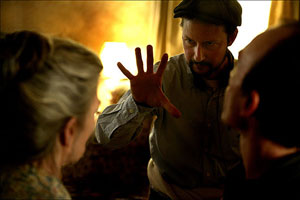 of that. Leon had a hand in every aspect of production, from casting – including casting me in Eyes Wide Shut – all through production. He was an incredibly valuable person to have the ability to collaborate with. He helped me at the end of In The Bedroom with some very key things, so I asked him if he would like to work together.
of that. Leon had a hand in every aspect of production, from casting – including casting me in Eyes Wide Shut – all through production. He was an incredibly valuable person to have the ability to collaborate with. He helped me at the end of In The Bedroom with some very key things, so I asked him if he would like to work together.
Leon has an incredible, enviable, knowledge about many things. It was Leon who had read this book and called me and said, ‘You need to read this right away. There’s something here.’ So the truth is that I probably wouldn’t have read this book without him.
Q: I hate to even ask this, but has anyone brought up Desperate Housewives to you? As soon as the narrator comes in it’s hard not to think about it.
Field: You know, somebody has asked that and I’ll tell you this, which going back to the PBS question – I watch baseball and PBS, I’ve never seen the show. When people said Desperate Housewives and the voice over, I said, ‘Really?!’ And I asked Tom about it and Tom said, ‘I never watched that show either.’ I know what people have told me about the show, I don’t see this as Desperate Housewives. I see this as a woman at the crossroads trying to figure out who she is, and there are also a lot of other characters.
Q: Could it be a good angle for people who like the show, though? A way to bring them in?
Field: I think it’s terrible! Please don’t say that!